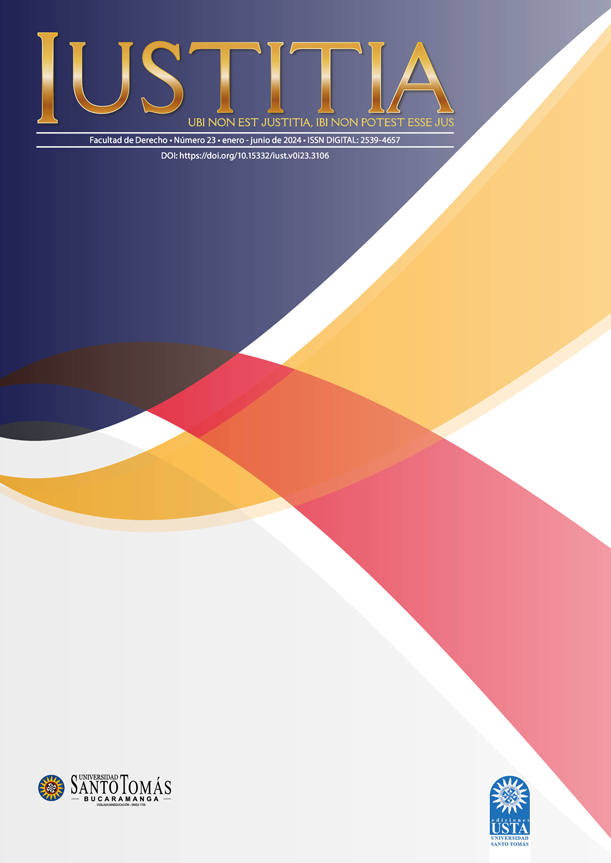The inclusion of moral assessments and indeterminate concepts in positive law as a degrading mechanism of private autonomy (critical legal thought in defense of private autonomy)
DOI:
https://doi.org/10.15332/iust.v0i23.3092Keywords:
legal formalism, autonomy of the will, private autonomy, moral assessments, indeterminate concepts, judicial interpretationAbstract
Positive law has traditionally strived to be objective and based on clear and precise rules. The introduction of moral assessments and indeterminate concepts can increase subjectivity, potentially making the uniform application of the law challenging. The inclusion of moral assessments and indeterminate concepts involves introducing subjective elements that undermine private autonomy by leaving certain aspects open to judicial interpretation, which could lead to arbitrariness or discrimination. Furthermore, the introduction of moral assessments and indeterminate concepts may also create legal uncertainty, as the lack of precise definitions could hinder the prediction of the legal consequences of certain actions. In conclusion, the incorporation of moral assessments and indeterminate concepts in positive law has negative implications for private autonomy, affecting fundamental principles of certainty and justice. Therefore, nowadays, advocating for legal formalism and preventing the degradation of the autonomy of the will by resisting the inclusion of moral assessments and indeterminate concepts in positive law is considered a critical legal perspective. This is a perspective to which we adhere and seek to explain in this work.
Downloads
References
Bobbio, Noberto (1958): Sui Formalismo Giuridico. Revista Italiana Do Diritto E Procedura Penale, N.S.I, 977-998.
Bobbio, Noberto. (1958). Teoría General Del Derecho. Madrid: Debate.
Coderch, J. (1997). Los Derechos Fundamentales En El Ámbito Privado. Barcelona: Bosch.
Engisch, Karl (2001): Introducción Al Pensamiento Jurídico. Ediciones Comares. Madrid, pp. 200-210.
Escudero Alday, Rafael (2004). Los Calificativos Del Positivismo Jurídico. El Debate Sobre La Incorporación De La Moral. Thomson. Civitas. Cuadernos Civitas. Madrid, pp. 81-90.
Escudero, J. A. (2004). La Indeterminación De Las Normas Jurídicas. Madrid: Trotta.
Fernández Gómez, Lorenzo (1981). Bases Filosóficas Para El Estudio Del Derecho. Madrid: Tecnos, D.L. Caracas. Universidad Católica Andrés Bello, pp. 232-240.
González Vicén, F. (1979). Sobre Los Orígenes Y Supuestos Del Formalismo En El Pensamiento Jurídico Contemporáneo, En Estudios De Filosofía Del Derecho. Universidad De La Laguna, 1979.
Greppi, Andrea (2001). ¿Hay Alternativa Al Formalismo De Los Juristas? En Jueces Para La Democracia. Num. 41, pp. 29-36.
Greppi, Andrea (2002). Razones Para Seguir Reglas. Observaciones Sobre Practical Rules. De A. H. Goldman. En Doxa. Cuadernos De Filosofía Del Derecho, Núm. 25, pp. 657-687
Greppi, Andrea (2003). Teoría Del Derecho. Madrid. Trotta.
Hart, H. L. A. (1994). The Concept of Law. 2nd End Fontamara. Oxford, England. Edit. Oxford University Press, pp. 98-110.
Hernández Gil, A. (1988). Formalismo, Antiformalismo Y Codificación. En Obras Completas, Vol. V: Metodología De La Ciencia Del Derecho. España, Madrid, pp. 112.
Hernández, J. L. (1988). La Aplicación De Los Derechos Fundamentales En El Ámbito Privado. Revista Española De Derecho Constitucional, 24, pp. 115-144.
Hoerster, Nobert: (1987). En Defensa Del Positivismo Jurídico. Gedisa, Madrid, pp. 93.
Kant, H. (1999). Fundamentación De La Metafísica De Las Costumbres y Principios Metafísicos Del Derecho. Enciclopedia De La Filosofía, T. Viii Y Ix, Ed. Kapeluz, pp. 121-126.
Kelsen, Hans. (1941) La Teoría Pura Del Derecho. Buenos Aires, Edit. Losada, pp. 139.
Larenz, K. (1994) Metodología De La Ciencia Del Derecho. Trad. M. Rodríguez Molinero, Barcelona, Ariel, pp. 89.
Preciado Hernández, Rafael (1982). Lecciones De Filosofía Del Derecho. Unam, pp. 77-85.
Recasens Siches, Luís (2003). Filosofía Del Derecho. Porrúa, pp. 111-117.
Ross, Alf (1963). Sobre El Derecho Y La Justicia. Editorial Universitaria De Buenos Aires (Eudeba), pp. 105-151.
Sarazá Jimena, Rafael (2008). Jueces, Derechos Fundamentales Y Relaciones Entre Particulares. Logroño, Universidad De La Rioja, pp. 92.
Von Munich, Ingo (1997). Los Derechos Fundamentales En El Derecho Civil. Revista De Derecho Privado, 73, pp. 103-128.
Downloads
Published
Versions
- 2025-04-24 (3)
- 2025-04-09 (2)
- 2024-05-15 (1)
How to Cite
Issue
Section
License
Copyright (c) 2024 IUSTITIA

This work is licensed under a Creative Commons Attribution-NonCommercial 4.0 International License.









